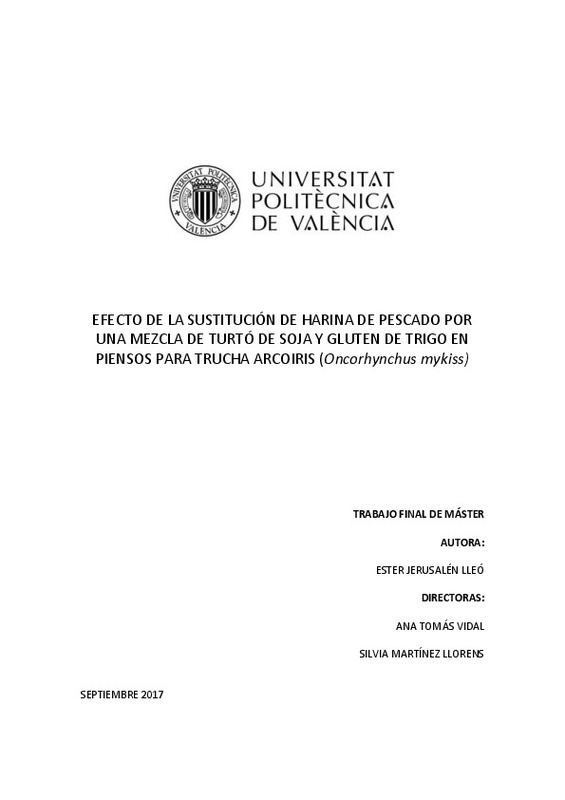|
Resumen:
|
[EN]
Based on projected population growth over the next few decades, the aquaculture sector has become necessary in order to provide for the population's protein requirements, since most of the fishing grounds are currently ...[+]
[EN]
Based on projected population growth over the next few decades, the aquaculture sector has become necessary in order to provide for the population's protein requirements, since most of the fishing grounds are currently overexploited. The optimization of food management and the formulation of feeds in the aquaculture sector are one of the most important solutions in order to reduce the production cost in this sector. Originally, aquaculture feed was formulated based on fishmeal and fish oils obtained from commercial fishing, which is actually a limited and unsustainable resource, from an environment as well as from an economical point of view. The objective of this study is to evaluate the growth and nutritional parameters of the rainbow trout, supplied with different feed, with a high substitution of fishmeal, for a mixture of vegetable meals, made up mainly of soybean press cake and wheat gluten. Animals in groups of 40 and with an average starting weight of 14g were used. Every feed was tested three times. The experiment lasted 78 days. The average survival rate was slightly higher than 50% due to the high temperature. The results show significantly (p <0.05) that the higher the substitution levels, the worse the results in final weight, the instantaneous growth rate, the feed conversión index and the coefficient of growth efficiency.The higher sustitution levels increase significantly the results of the viscerosomatic index and the hepatosomatic index. The results of the efficiencies retentions were lower tan the least amount of fishmeal in the feed.
[-]
La acuicultura es una de las industrias de producción animal con mayor tasa de crecimiento en todo el mundo y su sostenibilidad depende en gran medida de la reducción de los costos de los piensos, por lo que es necesario ...[+]
La acuicultura es una de las industrias de producción animal con mayor tasa de crecimiento en todo el mundo y su sostenibilidad depende en gran medida de la reducción de los costos de los piensos, por lo que es necesario buscar nuevos ingredientes para los piensos capaces de provocar un crecimiento efectivo de los peces a costos reducidos, sin afectar a la salud de los mismos.
Las sustituciones de harina de pescado por fuentes proteicas alternativas de origen vegetal y animal, se han estudiado ampliamente en los últimos años dado a que suelen ser más económicas y cuentan con una mayor disponibilidad. Las fuentes de proteína de origen vegetal han recibido la mayor atención debido a su bajo costo, alta calidad y altos rendimientos anuales, pero altas sustituciones con estas fuentes proteicas afectan el crecimiento de los peces y reducen la utilización de los nutrientes, especialmente en las especies carnívoras, además de contener compuestos antinutritivos que empeoran el aprovechamiento de los nutrientes y la salud intestinal. Esto hace que sea necesario suplementar los piensos con aditivos con el fin de aumentar la ingesta, mejorar la digestibilidad y la utilización del alimento, incrementar la ganancia en peso y evitar problemas con el sistema inmuitario.
[-]
|







